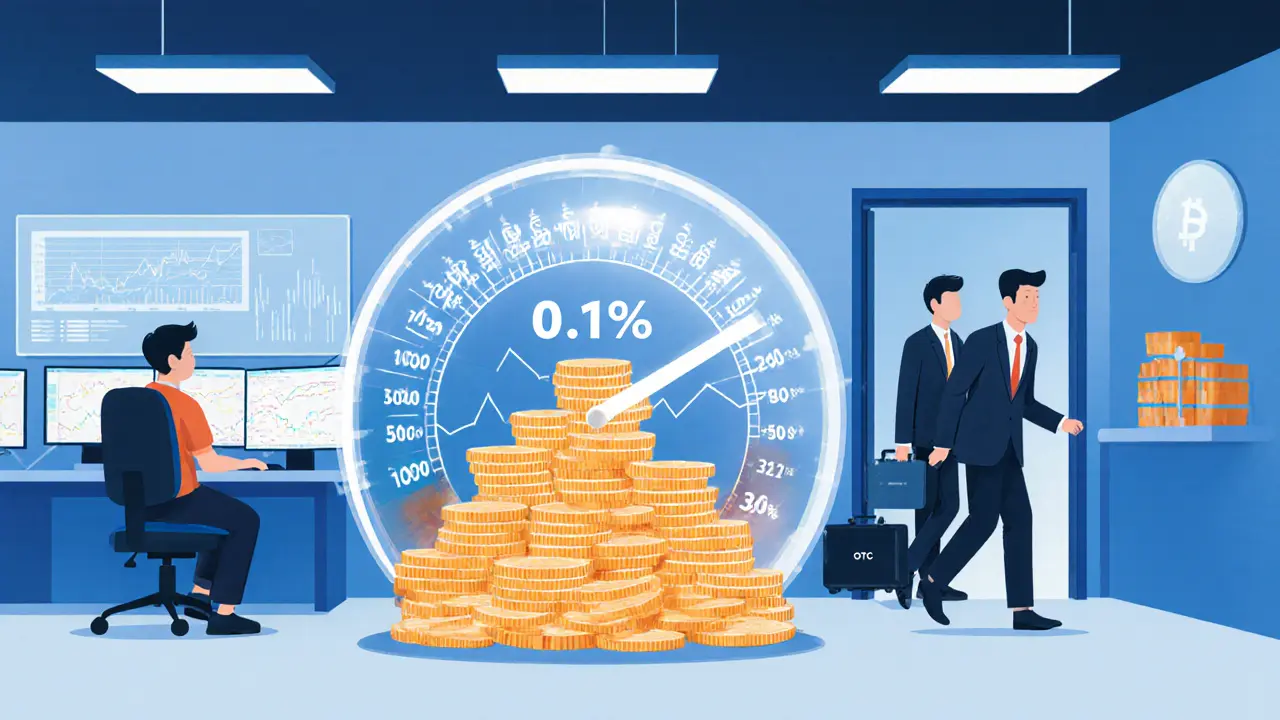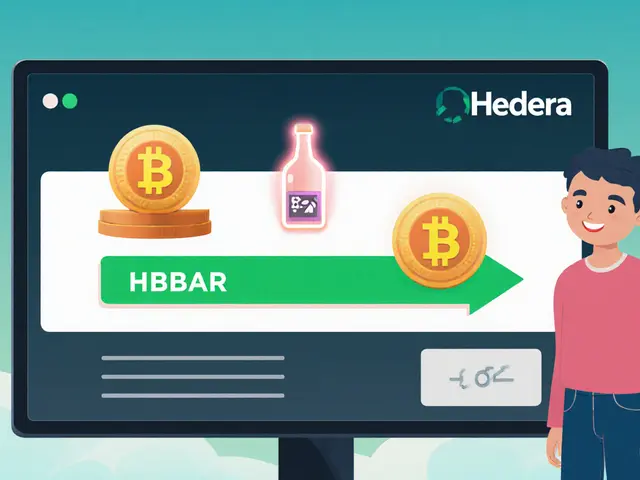Vietnam Crypto Tax Calculator
Calculate Your Tax Burden
This calculator shows how Vietnam's 0.1% transaction tax impacts your trading activity.
Tax Breakdown
Your first $400 (10 million VND) in annual crypto gains are tax-free
Important Notes
This calculator only shows the 0.1% transaction tax. Remember, Vietnam also has:
- Capital Gains - 20% on profit when converting to VND
- Mining/Staking - 5-35% personal income tax
- Airdrops - Taxed at your personal income rate
On January 1, 2026, Vietnam will begin taxing every single crypto trade at 0.1%-no exceptions. It doesn’t matter if you made a profit, broke even, or lost money. Every time you buy, sell, or swap Bitcoin, Ethereum, or any other digital asset, the government takes 0.1% of the total trade value. That’s not a tax on gains. That’s a tax on the transaction itself. And it’s about to change how millions of Vietnamese investors trade crypto.
Why Vietnam Is Doing This
Vietnam isn’t trying to punish crypto users. It’s trying to catch up. For years, the country’s tax system ignored digital assets. People were buying and selling crypto worth billions, but the government saw almost nothing in taxes. Chainalysis data shows Vietnam has the fifth-highest crypto interest in the world and the third-most users on international exchanges. Around 17 million people-roughly 17% of the population-own cryptocurrency. The total market value? Over $100 billion. The Ministry of Finance looked at that number and asked: How are we not collecting anything? So they wrote a new law. The Digital Technology Industry Law, passed in June 2025, officially recognized crypto assets as something that can be owned, traded, and taxed. And now, the 0.1% transaction tax is the first concrete step to turn that recognition into revenue.How the Tax Actually Works
This isn’t a capital gains tax. You don’t calculate profit. You don’t subtract your cost basis. You just pay 0.1% of whatever amount you trade.- You buy $1,000 worth of Bitcoin → pay $1 in tax
- You sell it for $1,200 → pay $1.20 in tax
- You swap Bitcoin for Ethereum → pay $1.20 in tax again
What Else Is Taxed?
The 0.1% transaction tax is just one piece. Vietnam’s full crypto tax framework includes several other layers:- Capital gains: When you turn crypto into Vietnamese dong or another fiat currency, you pay 20% on the profit.
- Mining and staking: Income from these activities is taxed as personal income-between 5% and 35%, depending on your total earnings.
- Airdrops: If you get free tokens, they’re treated as income and taxed at your personal rate.
- Businesses: Crypto exchanges and trading platforms pay 20% corporate income tax. Their service fees also get hit with 10% VAT.
- Exemption: The first 10 million VND ($400) in annual crypto gains are tax-free. That helps small investors who aren’t trading heavily.

Why Traders Are Worried
The biggest problem? This tax breaks how trading actually works. Market makers-those firms that keep prices stable by buying and selling constantly-make profits of about 0.01% per trade. The new 0.1% tax is ten times higher than their margin. That means they can’t afford to operate under this system. If market makers pull out, trading spreads widen. Buy orders go up. Sell orders go down. You end up paying more to buy and getting less when you sell. Binance raised this exact concern in October 2025. They warned the Ministry of Finance that the tax could make Vietnam’s crypto markets less liquid, less efficient, and ultimately less attractive. The same thing happened in South Korea when they introduced a similar tax. Trading volumes dropped. Retail traders moved to offshore platforms. And here’s the cruel twist: the tax is based on gross transaction value, not profit. So if you’re day trading and flipping crypto 50 times a week, you’re paying tax on every single trade-even if your net result is a loss.Who’s Paying? And Who’s Getting Paid?
The Vietnam Blockchain Association estimates this tax could bring in over $800 million a year. That’s a huge windfall for the government. It’s more than the country collects from some traditional industries. But who’s actually paying it? Not the big whales. They’re using over-the-counter (OTC) desks or offshore exchanges. It’s the average person-students, teachers, factory workers-who trade on local platforms like VinaCapital or SushiSwap Vietnam-who will feel the pinch. The government says it’s not targeting them. But the structure of the tax makes it impossible to avoid. If you’re using a Vietnamese exchange, the tax will be automatically deducted. No option. No appeal.What’s Being Done to Fix It?
The government knows this could backfire. That’s why they’re starting with a pilot program. The full tax won’t roll out everywhere on January 1, 2026. Instead, a small group of exchanges will be selected to test the system. The government will monitor trading volumes, spreads, user complaints, and tax collection rates. There are already talks about adjustments:- A 10% corporate tax break for pilot exchanges for their first five years
- Exempting VAT on crypto-to-crypto trades
- Lowering the transaction tax to 0.05% for trades under $1,000
- Allowing exchanges to absorb part of the tax to keep spreads narrow
What You Should Do Now
If you’re a crypto user in Vietnam:- Track every trade. Even if the exchange deducts the tax, keep your own records. You’ll need them for your annual tax filing.
- Don’t panic-sell. Moving your crypto to an offshore exchange won’t save you. Vietnam’s tax law applies to residents, no matter where the trade happens.
- Use the $400 exemption wisely. If you’re a small investor, try to keep your annual gains under 10 million VND. That means holding longer and trading less.
- Watch for updates. The pilot program runs through mid-2026. Changes are likely.
Where This Fits Globally
Vietnam isn’t alone. The U.S. taxes crypto gains. The UK taxes capital gains. Japan taxes income from staking. But Vietnam is one of the first countries to apply a transaction tax at scale. The OECD recommends gross transaction taxes only for high-frequency trading, not retail users. Vietnam’s approach ignores that advice. But it’s also one of the most aggressive in Asia. Countries like Singapore and Malaysia are watching closely. If Vietnam’s tax brings in billions without crashing the market, others may copy it. If it drives traders away, they’ll avoid it.Final Reality Check
This isn’t about fairness. It’s about revenue. The Vietnamese government sees crypto as a cash cow-and they’re going to milk it. Whether that’s smart or not depends on whether they care more about short-term cash or long-term market health. For now, if you trade crypto in Vietnam, you’re paying the tax. No way around it. The only question is: will the government adjust before it breaks the market? Or will they wait until it’s too late to fix?One thing’s certain: the era of crypto being tax-free in Vietnam is over.



